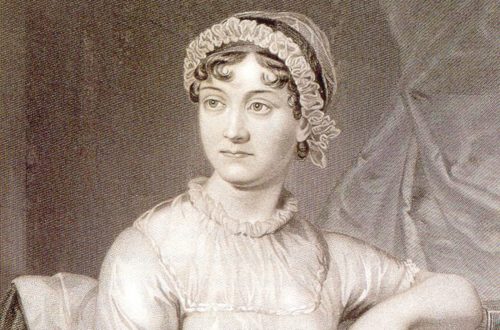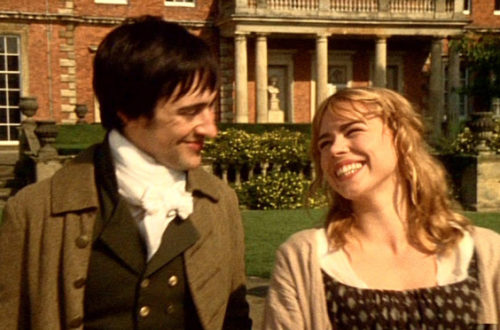A Note from Lady M: Elizabeth Mansfield wrote this article for a much earlier version of her website, sometime in the 1990’s. Her daughter does not recall the conversation illustrated in the article, although it does sound like something she might have said.
If you are a visitor to this website, you are probably a reader of Romances. But since most romance-readers want to spend their time reading actual romances rather than reading about them, I began to wonder who would be motivated to be reading this. And I figured that you had to be one of three types:
Either you’re a very intellectual romance reader
or
You’re a writer or would-be writer with a romance hidden in your mind or your closet
or
You were fiddling around the web and fell in here by accident.
If my theory is right, this essay will be appropriate the first two groups and pleasant enough for the third. If my theory is wrong, don’t tell me. It’s too late for revisions.
It’s hard for an aging Jewish Mother with not a touch of glamor to talk about Romance and be convincing. So I gave a lot of thought to what I was going to write. I do write love stories for a living, so I’m going to talk about writing love stories and why it’s a pretty good idea for anyone who’s thinking about doing it NOT to do it. I think I can be pretty convincing about that.
In the course of this essay, I will be touching on subjects like love and sex and romance, so those of you who dropped in for the fun of it, stay tuned.
My being a Jewish mother has quite an input into today’s essay. My daughter is a girl who never minces words. She has not lived at home since she graduated from high school, two decades ago. Not long ago she came home to take some of the boxes she’d stored in my basement since her college days. I was helping her pack and a saw that she had a large file drawer. “Files?” I asked. “You kept files in high school?”
“Sure,” she said. “I had files about everything. Even you.”
“Me?” I was flattered. “Really? Can I look? What’s it filed under, M for Mother?”
She gave me that look. Disdain. Pity. “No mom, under G. G for grief.”
Later, it occurred to me that keeping a Grief File was not a bad idea. I now have one, quite full, too. So all the material you’ll hear today came from my Grief File.
My topic: FIVE REASONS NOT TO WRITE A ROMANCE
Reason #1. Whatever you dream will happen if you write a romance won’t happen that way. For example, you probably think there’s a big payoff for a published book. You’ll struggle for a while, but then you’ll hit it big and voila … a house in Malibu and an endless stream of royalty checks.
The truth? There won’t be a publisher’s party for you on the day of publication. That was only for Jackie Kennedy. There won’t be a house in Malibu. There won’t be a stint on Oprah.
Here’s the cause: 50,000+ books published each year. Blockbuster bestsellers? Maybe 10.
In some ways it’s as chancy as a lottery.
Yes, some get rich. Danielle Steele, Stephen King. Why those? I don’t know.
Danielle Steele, I think, touches some common thread — love and the problems to that love caused by physical illness …
I certainly can’t explain the phenomenon of Stephen King. He once wrote a story about a writer who kept elves enslaved in a closet doing his writing. I almost believe Stephen King really has elves in his closet doing his writing. No human being can manage such a vast and successful output.
There are three stages of a professional writing life: yearning, learning and earning. The average writer earns $5000 a year (Author’s Guild stat.) and has to hold down a real job to support himself. The earnings for a good professional may make him an adequate living if he can pour out enough writing that enough people want to read. Usually, even very good writers support themselves with other work, usually teaching. I have a great new book out. I think it’s a fine, meaningful, original story. It’s never going to earn me a house in Malibu. I’m hoping I’ll earn enough to replace the cracked tile in my entrance hall.
But let’s say money doesn’t interest you. You want to write because you always wanted to write. Very good. That’s the best — maybe the only — reason for doing it. But that brings us to
Reason #2. Writing the book is harder than you think.
Someone once wrote: Writing is easy. All you have to do is sit down at the keyboard and open a vein. I’ll be honest … I don’t do that kind of writing. For me it’s a lot like daydreaming, at least at the beginning, when I’m creating the characters and imagining the situations they’ll have to face. That’s the easiest part, but still not easy.
You have to create original characters, not cliches. For example:
10% of the male population of the English-speaking countries have eyes which can be described as gray. If we count those gray-eyed males who also have swarthy complexions, the percentage drops to .622, less than one percent of the population. Yet in a recent, exhaustive survey of 17,979 heroes of romantic fiction, 17,969 of them had gray eyes and swarthy complexions. Does that astounding fact say anything to you?
So just your descriptions of the characters is a challenge.
And the situations have to have conflict, yet be believable, dramatic and suspenseful. Do you know how to create suspense? And once you’ve done that, the hard part comes. Writing the story.
First, the language. How comfortable are you with your native language?
And even if you’re very confident of yourself in that regard, do you know the language your character will speak? Can you write convincingly in the speech of the upper-crust? Or Valley-speak? Or the tongue of a knight in medieval England? Or a housemaid in 1820? Whatever millieu you choose to write in, there are all sorts of difficulties ahead. Take something as simple as the world “said.” He said and she said. How much can you repeat it? When do you leave it off? If you leave it off too much, what happens? The reader will have to count backwards to figure out, that’s what happens.
So you decide to use synonyms — he expostulated, she declaimed. Ugh! (Those who know say a simple “said” is best.)
Okay, you’re going to tell me that Lacy Loveapple sold a million copies of CAPTIVE’S KISSES, made a six figure advance and can’t write a good sentence. I can’t explain her, she must have something — a talent for reaching the female psyche, a way of describing sexual attraction that steams the reader, a friend in high places … but I can pretty well predict that it probably won’t happen to us. The nature of luck is that it happens to relatively few. We can all name a number of relatively-weak writers who’ve made it big, but, believe me, there are thousands who are trying and are not making it.
Since most of us are not likely to be as lucky as Ms. lacy Loveapple, we have to learn how to write. And that brings us to …
Reason #3. Don’t do it if you don’t like rewriting.
English has more words than any other language, but for the writer they’re not enough
I spend most of my time doing that. Editors don’t do it for you.
It’s the little words that get you. The prepositions. What choices would you make in the following sentences:
- Penny wanted to accompany Jack on his rounds, but Lady Cheselden insisted that she spend the morning (in … on … at) a fitting with the seamstress.
- Jane awoke (with .. .in) a luxurious sensation of warmth.
- She wanted to stay abed (til, till, until) the sun reached the top of the large elm.
If searching for the perfect word isn’t something you enjoy, maybe reading a romance will be more rewarding than writing one. For example, one of the problems you’ll have to face is searching for the proper “look.” Lovers are always looking at each other. Did Alice peer gazed, glare, stare, or throw a glance at the handsome Zeke?
Here’s one many writers seem to get wrong: She peered up at the painting (which … that) adorned the wall.
Roget’s Thesaurus is a reference book every writer has on a handy shelf. It doesn’t always help. The other day I wanted a synonym for the word experience:
Roget Iisted: emotion, event, knowledge, sensation. None of them were what I wanted. English has more words than any other language, but for the writer they’re not enough.
The writers I know love worrying about things like this. If you want to write, you should enjoy this sort of thing, too.
Basically, you have to keep in mind that the reason why a writer’s form of expression may seem quite clear to her but obscure to the reader is that the writer is advancing from thought to language, and the reader is advancing from language to thought.
Reason #4: Don’t write a romance if you HAVEN’T DECIDED how to handle love, sex and the difference between the two.
Let me illustrate by describing two extremes:
On the one hand is the type like the naive little woman who asked her husband: “Dear, that war between the sexes– when was that?”
On the other hand is the type who thinks about sex all the time, like the woman who undergoes a Rorshach test for a psychologist. He shows her a blot, and she says, “It’s the sex act.” He shows her another, and she says, “It’s the sex act.” He shows a third, and she says “It’s the sex act.”
“Madam,” the doctor says, “you are obsessed about sex.”
The woman looks astounded. “Me?” she asks. “I have an obsession? Who’s been drawing all those off-color pictures?”
(Thought for today: no one believes in rheumatism or true love until after his first attack.)
For our purposes, I’ve divided possible sexual attitudes into three representative groups:
- people who think love and sex are synonymous. They probably don’t read.
- people who think sex leads to love. These read and write bodice-rippers … the kind of romance where you will find a sex act every ten pages.
- people who believe that love leads to sex — the true romantics. Regency readers. Not as numerous as the others.
Actually, if you can write explicit sex scenes well, without flinching or embarrassment, go to it. There’s more money in that than in the more modest romances.
Love is a strong -perhaps the strongest- emotion, and therefore it arouses the reader more than any other. My own personal place on the spectrum is a belief that you don’t really need explicit sexual detail to arouse a reader. Sometimes a touch of the hand, or even a well-described glance, is enough
REASON #5. You’ll get no respect.
I can prove it with my own experiences:
- My children don’t tell anyone what I do for a living.
- My friends and acquaintances don’t buy my books. They want them free. The woman who cuts my hair, the nurse in the doctor’s office and the mailman all want free books. They don’t believe that I only get five free copies from the publisher.
- A friend called from New York to ask how come I am never on Oprah when all sorts of other writers no one’s ever heard of are on Oprah.
- I was interviewed by a journalist who told me when we’d finished that she’d never write my sort of book because “it spoils you for real writing.”
- Everyone in the world is either a professed or a closet writer, and they are all secretly convinced they can do it better than you.
- You get compliments that are more like insults: I collect them in my grief file.
Here’s my favorite;
I was a guest at a wedding recently. The father of the bride introduced me to his brother. “This is Paula,” he said. “You know who she is. Our writer friend. I sent you her novel.”
The man gave me a big smile. “Oh, yes!” he said, shaking my hand eagerly.
“I read half your book!’
Seriously, though, I hope I haven’t discouraged you from trying. I just wanted you to be prepared. They’re really meant to demonstrate that you can write a romance if you truly want to. But there are many serious reasons that keep people from writing, one in particular that is hard to overcome. Writing — good writing — creates in the reader a kind of awe, a feeling that you never could do as well. It’s a feeling that kept me from writing for years. Don’t let that awe stop you from trying. Even the best writers are full of feelings of insecurity. Byron, one of the greatest poets in the English language, once wrote a poem of praise to the ancient Greeks who wrote their exquisite poetry accompanied by a lyre. He ends with the couplet:
And must thy lyre, so long divine, Degenerate into hands like mine.
Feeling that way did not stop Byron. Don’t let it stop you.
In truth, there are as many positive reasons for writing a romance as negative ones.
- There’s the joy of feeling your characters come alive.
- The pleasure of getting up in the morning and knowing that today you’re finally going to write that climactic scene where the heroine finds out the secret you’ve kept her from knowing for two hundred pages.
- The sense of relief when you think of a clever way for the hero to get out of the mess you’ve gotten him into.
- The thrill when you read a sentence you’ve just written and realize it’s great. The satisfaction, after struggling through four hundred and sixteen pages, of typing The End.
- There’s the special feeling when you open an unexpected package and there are the five copies of your book in all their pristine perfection. At that moment, you’ll feel a bit like James M. Barrie. He said that for several days after his first book was published, he carried it around in his pocket and took surreptitious peeps at it to make sure that the ink hadn’t faded.
May the ink never fade on your first romance.



